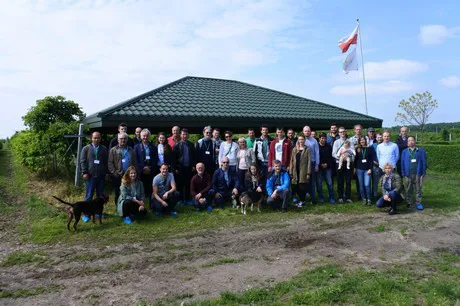
On 23 and 24 May, the international study group for the kiwi berry came together in Warsaw, Poland, at the campus of the Warsaw University of Life Sciences - SGGW. It was the tenth edition of an intense two-day gathering, during which the international study group gathers in a host country to exchange experiences and knowledge about the production of kiwi berry. As every year, the organisation is coordinated by the growers’ group of the University of Ghent in cooperation with the Pomological Association of East Flanders.
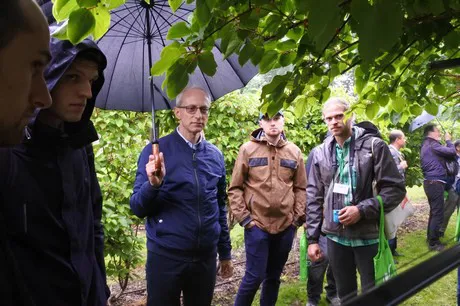
Quite a bit of interest for the collection garden of Professor Piotr Latocha.
Besides lectures, field visits are organised every year as well, to discuss a number of practical production aspects and to study the local approach to the production of kiwi berry. After all, the production circumstances and approach vary per country.
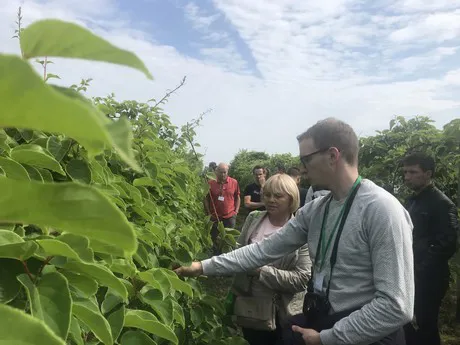
Visiting the orchard of Kiwi Berry Kostrzewa.
The study group kiwi berry consists of researchers, growers, agriculturalists and representatives from the fruit trade. In addition to participants from Belgium, there were also participants from Germany, the UK, Italy, Austria, Ukraine, Poland, Portugal, Romania and Switzerland, but also from New Zealand and China.
The topics that were discussed during this tenth edition mostly focused on fruit quality, storage, seed improvement and economical aspects. For the first time ever, a poster session was held as well, which focused on variety research, fertilisation and fruit quality.
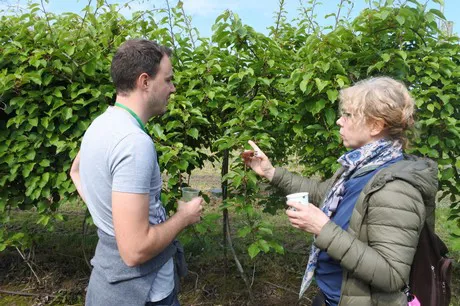
Fertilisation specialists Jonas Decorte from Belgium and Barbara Lata from Poland in discussion.
During the welcome speech, chairperson Filip Debersaques (University of Ghent, Belgium), emphasised the importance of exchanging knowledge and experiences to achieve a good quality fruit. This is the key to success. He also proclaimed that all knowledge and experiences will be bundled in an English-language kiwi berry book that will be published this year.
During the first session, Luca Fiorentini (Skool Innovation ltd, New Zealand) made an interesting contribution about the importance of flavour for the kiwi berry, and the important part the grower plays in this during the production and the harvest. He said that the auction or pack house, among other things, won’t be where quality improves, the grower sets the starting value of quality, after which it can only remain the same or decrease. Researcher Tomasz Krupa (SGGW, Poland) talked about the various methods of storing the kiwi berry as long as possible. He warned for the consequences if CO2 levels are too high in the cooling chamber. After that, Callum Kay (Skool Innovation ltd, New Zealand) talked about one of the most difficult topics: how to achieve the best ripeness of kiwi berry, and how to decide the optimal picking moment. He suggested a formula based on that of the kiwi fruit production.
During the second session, Florin Stanica (University of Bucharest, Romania) talked about the experiences of some Romanian cultivars. He suggested setting up a variety comparison in the same manner in various regions (countries). Alexander Zimmerman (Bavarian research institute, Germany) presented his findings on some German cultivars. Yan Chang Wang (Botanical Garden Wuhan, China) explained his genetic research and talked about a number of Chinese kiwi berry varieties.
In the final session, a number of economical aspects were passed in review. Piotr Latocha of the Polish Warsaw University of Life Sciences - SGGW introduced the current situation of the kiwi berry production and marketing. The production increase also continues to struggle with the unfamiliarity of the fruit among the general public. Night frosts in spring are still a problem as well. The young grower Adam Krostrzewa (Minikiwi Kostrzwa, Poland) talked about the experiences in his company, which he took over from his father, during the period of its founding in 2011 up to now. He emphasised the opportunities of the production, but also that there’s a long road still ahead regarding production knowledge. For example, he is now, after last year’s record harvest, confronted with an off-year for the Geneva variety. But the dynamic approach of this young grower makes everyone hope for the best for the future.
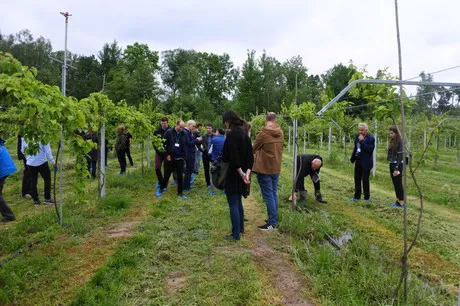
Visiting the orchard of Grzegorz Kostrzak.
Besides theory, a lot of time was also set aside for practice: naturally, kiwi berry plantations were visited as well. At the university, the collection garden of Professor Piotr Latocha was visited, the home base of the Bingo variety. We were invited in the orchards of Minikiwi Kostrzewa (three hectares) and Grzegorz Kostrzak (1.33 hectares) as well. Like every year, there was a lot of interest in how pruning, fertilisation, pollination and other things are handled. Considering pros and cons of the various systems in the various countries always lead to interesting discussions. There was also time to look at other productions, such as Cornelian cherry (Cornus mas), strawberry (gutters on coconut substrate) and blackberry in pots (long cane).
This tenth edition was very enjoyable, in part thanks to the dedication of Polish host Professor Piotr Latocha. The network was once again strengthened and expanded, and plans for the next edition of the international kiwi berry meeting are already in the works, and this will be held in the north of Italy.
For more information:
Filip Debersaques
Hoofdlector Horticulture
University of Ghent
+32(0) 9 243 24 89
+32(0) 495 16 25 57
filip.debersaques@ugent.be
